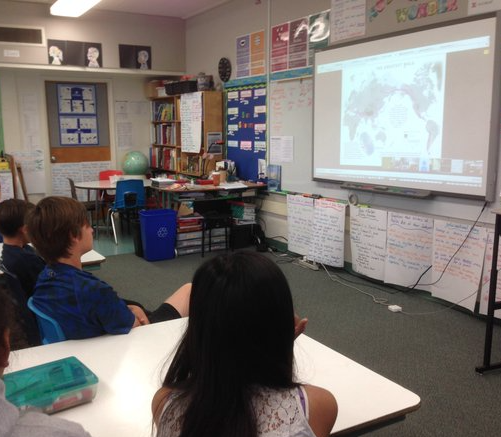I recently watched Gordon Brown’s Ted Talk,
“The power of our moral sense allied to the power of modern communications and our ability to organize internationally. That in my view gives us the first opportunity as a community to fundamentally change the world.” -Gordon Brown
As I reflect on that quote and the competencies required of individuals to change the world in this way, I am reminded of how educating young people can play an important role in developing a truly global society. I see 3 competencies that are vital: ethics, communication and action; with this comes the need to understand multiple perspectives and cultural differences/similarities. What does this look like in elementary school? How do we develop empathy and as Jason Silva mentioned in The Big Picture, extend our gaze to develop a massive transformation of consciousness?
I hear it everywhere… the purpose of education is to foster the ability to think critically and develop skills to be a productive member of society. But, I have also heard (especially in this age of high stakes testing) that the purpose of school for your children is to develop basic skills. Students absolutely need basic skills, but can’t we help students acquire those skills in ways that build a moral compass, empathy, communication and the desire to act?
What I very much appreciated in the article Setbacks Aside, Climate Change Is Finding Its Way Into the World’s Classrooms by Beth Gardiner was the idea of focusing on, “the “handprint” of individuals’ beneficial actions, rather than the harm suggested by an environmental footprint.” I sometimes worry that through news and current events we are depicting the world as very scary and unjust. Yes, we absolutely have many inequities and global problems, but I think if we start using the lens of what “handprints” are being left and what can we learn from those actions we might be able to turn some of these injustices into better learning opportunities for ways our young people can act.
On Wednesday, my class participated in a Google Hangout with Paul Salopek, a Journalist with National Geographic who is walking around the world for 7 years, following the path of early migration. If you have not heard of the Out of Eden Walk, check it out. And, as an educator check out Out of Eden Learn through Project Zero at Harvard. It has been a great way for my students to connect their world with students in Dubai, Australia, and Eastern United States (the countries represented in our walking party).

But, back to our Hangout with Paul. One of his messages was human kindness is everywhere. He stated, ”I’m being passed from kindness to kindness”. We have to remember this as much as discuss global problems.
Another way that we have focused on the “handprints” we can leave is when we studied teen activists. I got this idea from Lucy Calkins’ Units of Study in Writing . While students were reading about such issues as slavery, girls who weren’t allowed to go to school due to radical leaders and religious beliefs, or child labor, the focus that there were people out there acting and making a difference was powerful. Yet, while I was hoping they would be inspired and choose to act (I felt like I shouldn’t force them to and I’m not sure if this was the right choice), they have not done so yet. My question is how do we move from knowledge about global problems to acting to change and rid the world of those problems? As I think about that, while they showed a desire to act, they have no idea how to start.
We are starting small. This next week, students will be choosing one thing that they can do to make the world a better place. It can be small or large, but they need to commit to something. We will see how that goes, but I really want it to come from them, so I’m still thinking through this aspect.
Unfortunately, inequities are not just a global problem, they are a problem in our schools as well. When Gordon Brown spoke about how Olof Palme desired to abolish the poor and to let everyone have the chance to realize their potential to the full, it made me think about all the inequities in our schools: tracking, access to technology, access to powerful teaching and learning, etc. How are we doing at providing equitable learning experiences to all our students and are we providing all our students the chance to realize their potential to the full? This reminds me of a blog post I just read by Kristin Gray, a math coach on the east coast, regarding RTI. I agree that we have to develop strong interventions for students. It is vital, but are we being equitable and just in how we are doing it? This is an area we need to focus on. The article Money, Race and Success: How Your School District Compares was yet another reminder of this. We need to do a better job.
One way to improve equitable access to learning is through global education. When we provide all students with opportunities to interact with others and understand multiple perspectives, in addition to learning how to communicate in person, in writing, and online, while also developing empathy for others and providing all students with rich, relevant, meaningful tasks that foster critical thinking skills, we will be one step closer to developing a more just and equitable educational system and improved global society.
Ahhh…always more work to be done.